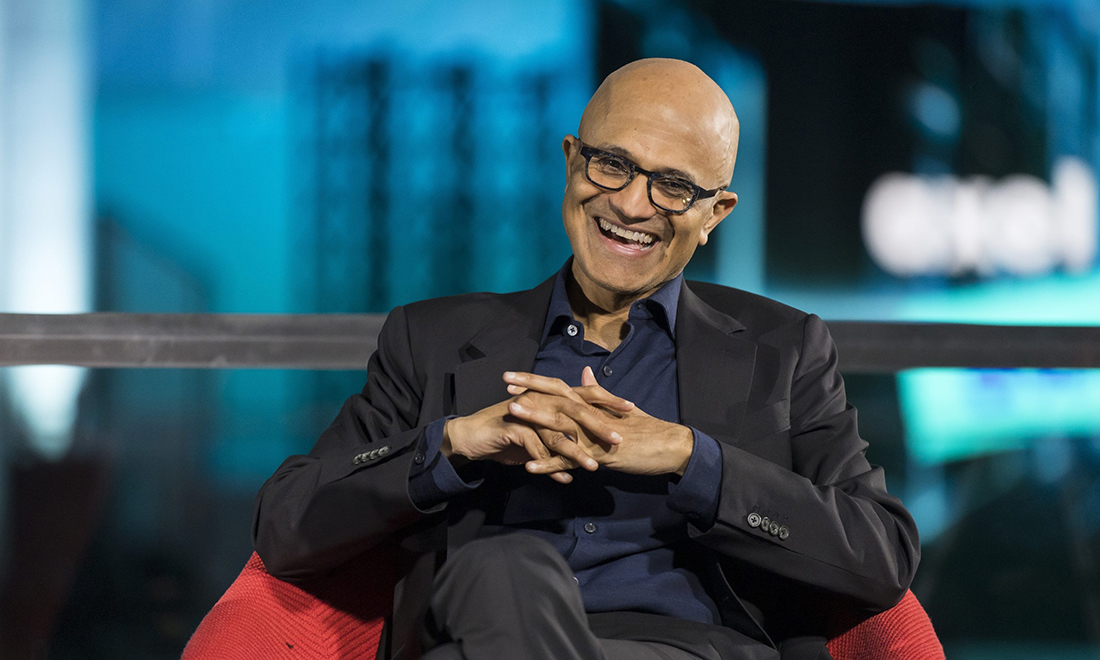
在當今的領導力領域,毫無疑問軟技能非常流行。但不要立刻將同理心與其他軟技能混為一談。這是因為,微軟(Microsoft)CEO薩蒂亞·納德拉堅信,理解他人的能力超越了軟技能。他認為,將同理心描述為“軟”技能,低估了它的重要性,因為他認為,同理心其實是最強大的技能。
納德拉在接受阿克塞爾·斯普林格集團(Axel Springer)CEO馬蒂亞斯·德普夫納采訪時表示:“同理心并不屬于軟技能。事實上,它是一項最難掌握的技能,它要求我們理解這個世界,和對我們最重要的人。”
納德拉認為,擁有同理心,不僅能讓領導者更好地與員工建立聯系,還能拉近與客戶的關系。
他補充道:“事實上,創新就是去滿足未被滿足的、無法言說的客戶需求。創新的來源是什么?有人說是設計思維。但設計思維就是同理心。”
納德拉強調同理心的重要性
印度裔美國人納德拉在2014年成為微軟首席執行官。這并非他第一次強調同理心在職場的力量。
納德拉曾在LinkedIn《你好,星期一》(Hello Monday)的一集播客中表示:“如果你對下屬有同理心,他們在工作中就會有最好的表現,你的工作就能取得進展。”
他之前還公開討論過,作為身患殘疾的兒子扎恩的父親,如何讓他變成更有同理心的領導者。他的兒子在2022年2月去世,當時只有26歲。
2017年,納德拉在LinkedIn上發表的一篇文章中稱:“作為[扎恩的]父母,我們不應該去追問‘為什么’,而是應該盡我們所能改善他的生活。”他在文中稱贊是妻子的同理心感染了他。
“從她身上,我學到了無論是作為父親還是CEO,如果我在一舉一動中都抱有同理心,就能產生巨大的力量。”
他在LinkedIn中寫道:“以父親的身份,面對有特殊需求的兒子……讓我產生了一種新的個人理念,希望將新的創意與對他人的同理心相關聯,并對踐行這個理念充滿熱情。因此我致力于攜手微軟的同事打破界限,將愛和同理心與人類的聰明才智和熱情相結合,從而產生影響,實現我們的使命。”
體育運動是培養軟技能的關鍵
除了撫養患有四肢癱瘓和腦癱的孩子這段經歷的巨大影響以外,納德拉還表示,在成長過程中從事板球運動,也塑造了他現在的領導風格。
他說道:“團隊運動對我們成為什么樣的公民和領導者,有著巨大的影響。”
另外一位節目嘉賓、前板球運動員扎希爾·汗認同他的觀點。他表示:“板球比賽就像是一曲交響樂,每一名球員都是一個音符。在板球比賽中的領導者,就是要做指明燈和靈感的來源。”
扎希爾·汗表示:“在板球比賽中,領導者不能傲慢,而是要謙遜。”之后他將話題轉移到納德拉作為CEO取得的成功。 “在薩蒂亞·納德拉的成長過程中,我們看到了這種原則在企業界得到了體現。”
最近的研究也認為,體育運動能夠幫助人們積累領導者需要的軟技能。因此,體育生比非體育生更有可能取得MBA學位、進入高層領導崗位和獲得更高收入。
畢竟,無論在賽場上還是在會議室里,最需要的品質都是溝通、團隊合作和領導力。
什么是軟技能?為什么軟技能很重要?
在職場中表現出脆弱并不是一種優勢,但在疫情期間,員工(面對隔離、更沉重的家庭責任負擔等)需要領導者傾聽他們的聲音,培養團隊意識,并幫助解決他們的問題。
與技術技能不同,軟技能決定了領導者與團隊互動的方式。情商、有效溝通、影響與激勵他人的能力等都是軟技能。
LinkedIn對全球近23,000名上班族的調查顯示,超過五分之三(61%)上班族表示,職場軟技能與硬技能同樣重要。
此外,對于同理心這種特別技能,2021年安永(Ernst & Young)調查的約90%的美國上班族表示,富有同理心的管理者能夠提高他們的工作滿意度、工作效率和忠誠度。
此外,超過一半表示他們之所以離職,是因為對于他們在工作或個人生活中遭遇的問題,老板沒有表現出足夠的同理心。(財富中文網)
翻譯:劉進龍
審校:汪皓
在當今的領導力領域,毫無疑問軟技能非常流行。但不要立刻將同理心與其他軟技能混為一談。這是因為,微軟(Microsoft)CEO薩蒂亞·納德拉堅信,理解他人的能力超越了軟技能。他認為,將同理心描述為“軟”技能,低估了它的重要性,因為他認為,同理心其實是最強大的技能。
納德拉在接受阿克塞爾·斯普林格集團(Axel Springer)CEO馬蒂亞斯·德普夫納采訪時表示:“同理心并不屬于軟技能。事實上,它是一項最難掌握的技能,它要求我們理解這個世界,和對我們最重要的人。”
納德拉認為,擁有同理心,不僅能讓領導者更好地與員工建立聯系,還能拉近與客戶的關系。
他補充道:“事實上,創新就是去滿足未被滿足的、無法言說的客戶需求。創新的來源是什么?有人說是設計思維。但設計思維就是同理心。”
納德拉強調同理心的重要性
印度裔美國人納德拉在2014年成為微軟首席執行官。這并非他第一次強調同理心在職場的力量。
納德拉曾在LinkedIn《你好,星期一》(Hello Monday)的一集播客中表示:“如果你對下屬有同理心,他們在工作中就會有最好的表現,你的工作就能取得進展。”
他之前還公開討論過,作為身患殘疾的兒子扎恩的父親,如何讓他變成更有同理心的領導者。他的兒子在2022年2月去世,當時只有26歲。
2017年,納德拉在LinkedIn上發表的一篇文章中稱:“作為[扎恩的]父母,我們不應該去追問‘為什么’,而是應該盡我們所能改善他的生活。”他在文中稱贊是妻子的同理心感染了他。
“從她身上,我學到了無論是作為父親還是CEO,如果我在一舉一動中都抱有同理心,就能產生巨大的力量。”
他在LinkedIn中寫道:“以父親的身份,面對有特殊需求的兒子……讓我產生了一種新的個人理念,希望將新的創意與對他人的同理心相關聯,并對踐行這個理念充滿熱情。因此我致力于攜手微軟的同事打破界限,將愛和同理心與人類的聰明才智和熱情相結合,從而產生影響,實現我們的使命。”
體育運動是培養軟技能的關鍵
除了撫養患有四肢癱瘓和腦癱的孩子這段經歷的巨大影響以外,納德拉還表示,在成長過程中從事板球運動,也塑造了他現在的領導風格。
他說道:“團隊運動對我們成為什么樣的公民和領導者,有著巨大的影響。”
另外一位節目嘉賓、前板球運動員扎希爾·汗認同他的觀點。他表示:“板球比賽就像是一曲交響樂,每一名球員都是一個音符。在板球比賽中的領導者,就是要做指明燈和靈感的來源。”
扎希爾·汗表示:“在板球比賽中,領導者不能傲慢,而是要謙遜。”之后他將話題轉移到納德拉作為CEO取得的成功。 “在薩蒂亞·納德拉的成長過程中,我們看到了這種原則在企業界得到了體現。”
最近的研究也認為,體育運動能夠幫助人們積累領導者需要的軟技能。因此,體育生比非體育生更有可能取得MBA學位、進入高層領導崗位和獲得更高收入。
畢竟,無論在賽場上還是在會議室里,最需要的品質都是溝通、團隊合作和領導力。
什么是軟技能?為什么軟技能很重要?
在職場中表現出脆弱并不是一種優勢,但在疫情期間,員工(面對隔離、更沉重的家庭責任負擔等)需要領導者傾聽他們的聲音,培養團隊意識,并幫助解決他們的問題。
與技術技能不同,軟技能決定了領導者與團隊互動的方式。情商、有效溝通、影響與激勵他人的能力等都是軟技能。
LinkedIn對全球近23,000名上班族的調查顯示,超過五分之三(61%)上班族表示,職場軟技能與硬技能同樣重要。
此外,對于同理心這種特別技能,2021年安永(Ernst & Young)調查的約90%的美國上班族表示,富有同理心的管理者能夠提高他們的工作滿意度、工作效率和忠誠度。
此外,超過一半表示他們之所以離職,是因為對于他們在工作或個人生活中遭遇的問題,老板沒有表現出足夠的同理心。(財富中文網)
翻譯:劉進龍
審校:汪皓
In today’s leadership landscape, soft skills are undeniably en vogue. However, don’t be quick to lump empathy in with the rest. That’s because Microsoft CEO Satya Nadella firmly believes that the art of comprehending others transcends the soft skills category. In his view, characterizing it as “soft” understates its significance, as he asserts that mastering empathy is, in fact, the most formidable skill of them all.
“Empathy is not a soft skill,” Nadella said in an interview with Axel Springer’s CEO Mathias D?pfner. “In fact, it’s the hardest skill we learn—to relate to the world, to relate to people that matter the most to us.”
Not only does being empathetic enable leaders to better connect with their staff, but according to Nadella, customers too.
“In fact, innovation is about meeting the unmet, unarticulated needs of customers,” he added. “What’s the source of that? Some would say design thinking. But design thinking is empathy.”
Nadella beats the empathy drum
It’s not the first time the Indian-American chief who took Microsft’s helm in 2014 has hailed the power of empathy at work.
“If you have empathy for your people, they will do their best work and you’ll make progress,” Nadella once said on an episode of LinkedIn’s “Hello Monday” podcast.
He’s also previously spoken out about how becoming a parent to his late disabled son Zain—who passed away in February 2022 at the age of 26—shaped him into a more empathic leader.
“As [Zain’s] parents, it was up to us not to question ‘why,’ but instead to do everything we could to improve his life,” Nadella wrote in a LinkedIn post in 2017, where he credited his wife’s empathy with inspiring his own.
“From her I have learned that when I infuse empathy into my everyday actions, it is powerful, whether they be in my role as a father or as a CEO.”
“Becoming a father of a son with special needs…has shaped my personal passion for and philosophy of connecting new ideas to empathy for others,” Nadella wrote on LinkedIn. “And it is why I am deeply committed to pushing the bounds on what love and compassion combined with human ingenuity and passion to have impact can accomplish with my colleagues at Microsoft.”
Sports are key to soft skills building
As well as the profound impact that raising a child with quadriplegic and cerebral palsy had, Nadella also revealed that playing cricket growing up shaped how he leads today.
“Team sports have a huge bearing on who we become as citizens and leaders,” he said.
“Cricket is a symphony, and every player is a note in that composition. Leadership in cricket is about being a guiding light and source of inspiration,” fellow panelist and former cricketer Zaheer Khan agreed.
“In cricket, we lead not with arrogance but with humility,” Khan added before turning his attention to Nadella’s success as a CEO. “In the journey of Satya Nadella, we see a reflection of these principles in the corporate world.”
Recent research has echoed that sports can be attributed to helping people bank the soft skills needed to lead. It’s why athletic students are significantly more likely to gain an MBA, land senior job rankings, and earn more money than their non-athletic counterparts.
Ultimately, communicating, teamwork, and leadership are desirable traits both on the pitch and in the boardroom.
What are soft skills and why are they important?
Being vulnerable hasn’t always been an asset in the workplace, but during the pandemic employees (who were struggling from isolation, burdened with increased household responsibilities, and more) needed leaders who could listen, build a sense of team community, and help fit work around their problems.
Unlike technical skills, soft skills determine how you interact with your team. Emotional intelligence, effective communication, and being able to influence and motivate are all a part of the repertoire.
According to LinkedIn’s research of nearly 23,000 workers worldwide, more than three in five (61%) workers say soft skills in the workplace are just as important as hard skills.
What’s more, when it comes specifically to empathy, almost 90% of U.S. workers surveyed in Ernst & Young’s 2021 report said that having an empathetic manager increases their job satisfaction, productivity, and cultivated loyalty.
Meanwhile, over half said that they had left a job because their boss wasn’t empathetic enough about issues at work or in their personal life.






